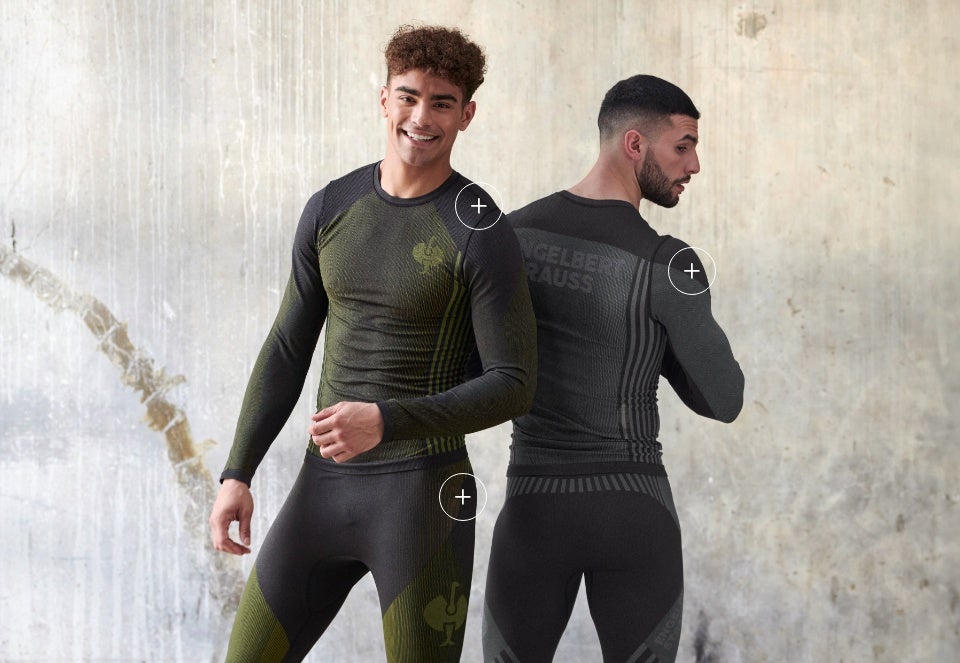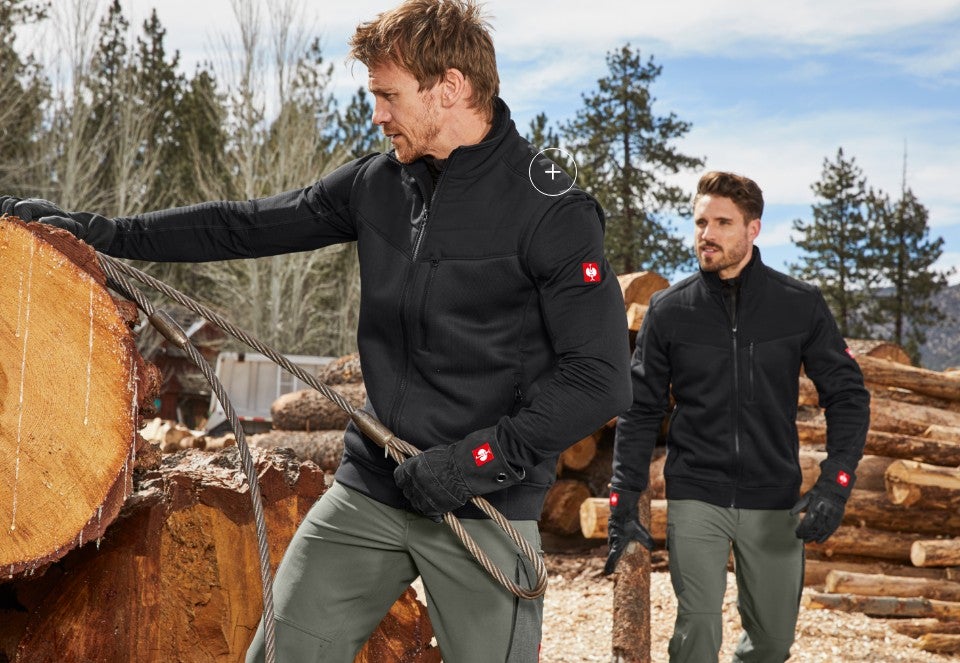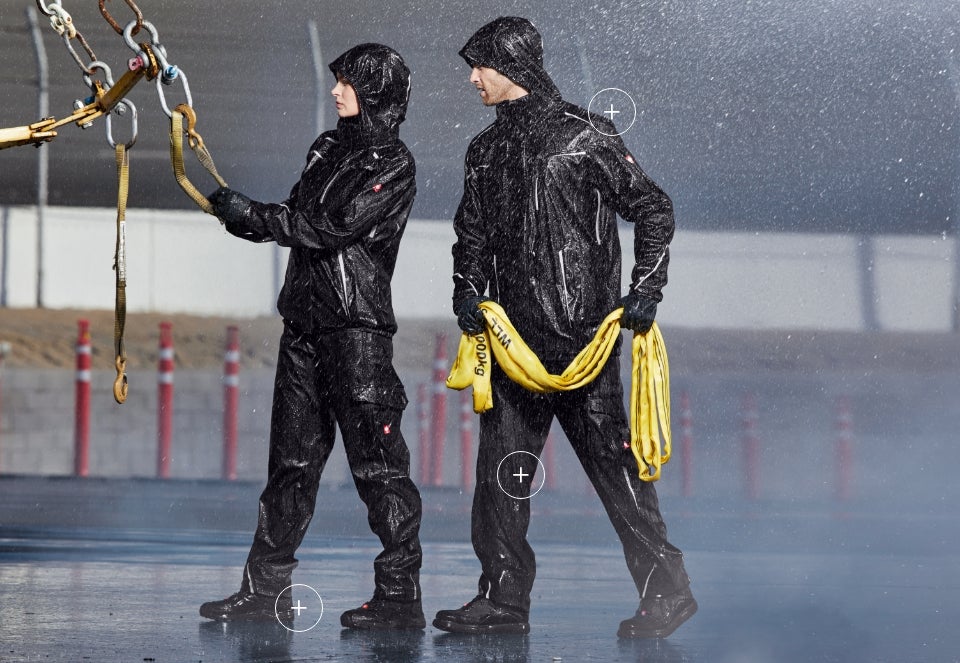

Functional Clothing
The weather can get really unpleasant sometimes, as everyone who works outdoors on a daily basis knows. Special protection is required, because a well-regulated body climate is essential for remaining healthy at work. Colds, chills and strains caused by cold muscles are the main factors for illness-related absences from work. Professional workwear is therefore also functional clothing that offers permanent protection against excessive heat, chills and the weather. Functional e.s. Workwear means better performance for strong teams!
Why "functional"?
We take it for granted that workwear is highly practical; in other words, that it ""functions"". Plenty of pockets and compartments right where you need them. Knee pad pockets, size-adjustable waist systems, tough and easy-care materials, optimum freedom of movement: they all function wonderfully!
But functional workwear is more than this: it combines the practical benefits of workwear with weather protection and the climate comfort properties of functional clothing.
The onion principle involves wearing several layers of garments to keep the body at a constant "operating temperature". If the functions of the individual layers are coordinated, the onion principle has a dual function: it regulates from the inside and protects from the outside.

Focus on transport
Full mobility, highly breathable - elastic functional underwear for the BASIC LAYER
BASE LAYER products sit directly on the skin and have one specific task: transportation! Excess heat and body moisture need to be absorbed and transported away from the skin quickly. Typical base-layer products are therefore highly breathable functional socks, functional underwear and functional T-shirts.





The optimum thermal level
The e.s. clima concept shows the optimum thermal level depending on the outside temperature and physical activity: functional socks and functional underwear for every job and temperature - ranging from "cool", to "light", through to "warm" and "x-warm".


+ for warm days
+ pleasantly lightweight
+ temperatures above 0°C

+ for warm days
+ pleasantly lightweight
+ climate-regulating

+ for cooler days
+ warming
+ pleasant climate feeling

+ for very cold days
+ extra warm
FIBERtwin®
Performance for above & below
FIBERtwin® - these are dynamic high-tech textiles with high-performance products for the first and second clothing layer. Thanks to special production techniques and material mixes, FIBERtwin® products come in a wide range of properties and functions.
+ Highly breathable, flexible functional underwear for the base layer
+ High-performance fleece with different surface structures for the thermal layer
FIBERtwin® - base layer
The highly functional lightweight garments of the FIBERtwin® BASIS series keep the wearer's body dry and fresh - even when they work strenuously. Typical examples of lower layer garments include the FIBERtwin® functional underwear and functional T-shirts.
+ Fast absorption and removal of moisture
+ Excellent freedom of movement
+ Kind to skin


Warmth Layer
Insulation and movement
Fleece jacket & Co. as a thermal layer – store warmth, give off heat
Protecting the body from penetrating cold whilst transporting excess heat to the outside at the same time: the thermal elements of the second layer must be able to react very flexibly. Typical elements of the thermal layer are therefore fleece jackets, fleece troyers, thermostretch troyers – elastic knitwear for more freedom of movement in various material thicknesses and thermal levels. Highly breathable mixed fabrics are ideal for optimum circulation of body heat and fresh air.



dryplexx® - thermal layer
dryplexx® textiles are highly breathable and can be integrated ideally into the multi-layer system. Highly flexible dryplexx® fleece and softshell products in various properties and structures are primarily used in the thermal layer.

BEATING THE ELEMENTS!
Work jackets acc. to DIN EN 343 - waterproof all-rounders for WEATHER PROTECTION
Weather protection is an essential factor for professional workwear when used outdoors, because extreme weather conditions are a challenge for any job. Flexibility is important here! All-weather jackets, two-layer jackets and 3-in-1 functional jackets offer ideal protection whatever the weather. Softshell jackets are flexible and lightweight. Of course, shoes also need to offer the right kind of protection, too. Work shoes and safety shoes by Strauss all have dryplexx® extreme and dryplexx® waterproof membrane technology.





norms & materials
Compliant with the European norm DIN EN 343:2003+ A1:2007 + AC:2009, our rainwear is tested with respect to its waterproof properties and breathability under standard loads at work. The waterproofing and breathability indicators are categorised into three classes, whereby the highest class provides the best protection and/or the best level of breathability.




|
Everyday use leads to more wear; therefore alternate functional clothing as frequently as possible.
|
Do not wash too frequently; air the outer layer frequently; remove dirt on the surface with a brush.
|
Never use a softener! This inhibits the breathability function of the workwear.
|


|
Use a clothes brush to remove most of the dirt and dust before machine washing.
|
Avoid creases and folds as far as possible. Hang workwear on a good clothes hanger or fold carefully.
|

Washing
Correct washing is often decisive for the service life of functional clothing. The washing temperature on the label should be observed – if there is no care label, functional jackets etc. should be washed on a gentle cycle (30° C / gentle wash). Zips and Velcro fasteners should be closed before washing, and the washing machine should not be loaded too full. Fabric softeners and softener additives in laundry detergents are strictly prohibited.

Ironing
Most functional textiles do not need to be ironed. It is usually enough to dry by hanging them on a clothes hangar or tumble dry.
If it does become necessary to iron the functional clothing, e.g. functional shirts, the following applies: Only iron at a low temperature without steam! Place a towel between the clothing and the iron to protect the material. Fleece jackets should not be ironed. It is better to briefly shake the garment after a delicate cycle, and hang up to dry.

Drying
Here, too, the following applies: Observe the care label! Generally speaking, heat has a positive effect on impregnated clothing.
Place products that can be tumble-dried into the dryer and dry for approx. half an hour - do not dry completely! Allow clothing, that cannot be tumble-dried according to the care label, to drip dry in the air.

Impregnating
The impregnation is the first protective layer against wet, dust and dirt. We therefore urgently recommend re-impregnating on a regular basis!
However, functional textiles should be treated with an impregnation agent, at the latest, when water no longer pearls off the outer fabric: either with a suitable washing impregnation agent or with a special impregnation spray for textiles after washing.

Shoe care
Breathable, waterproof work shoes need special care to maintain their performance. Regular cleaning, drying and impregnation preserves the function.
To do this, remove coarse dirt directly, then clean the shoes with luke-warm water and/or a special cleaning spray. Allow wet shoes to dry slowly, never on direct heat sources (radiators etc.). It also helps to stuff absorbent material into the shoes (e.g. newspaper). It makes sense to keep a spare pair of work shoes and to swap them every day.
We recommend impregnating work and safety shoes that have a climate membrane - before wearing for the first time and before applying a care agent for the first time.